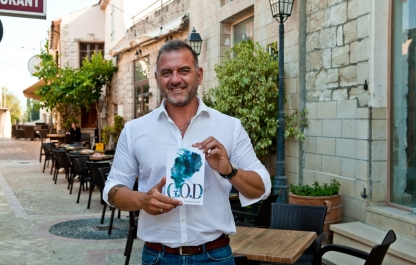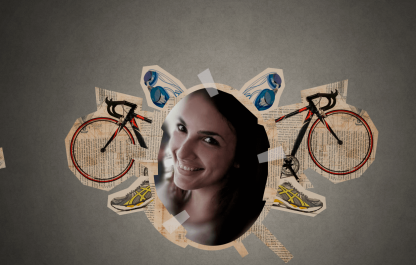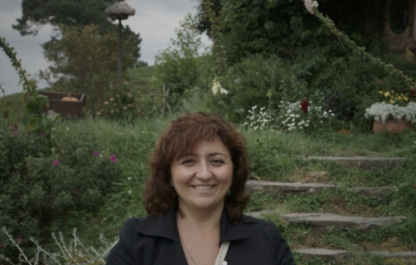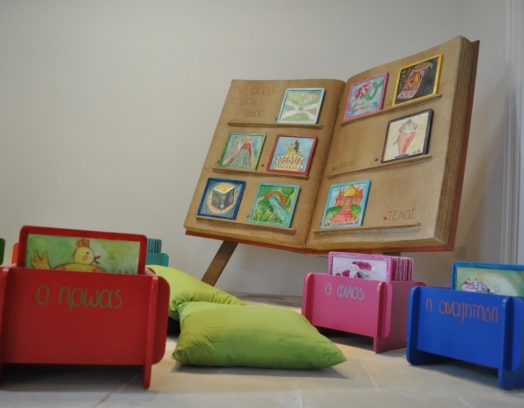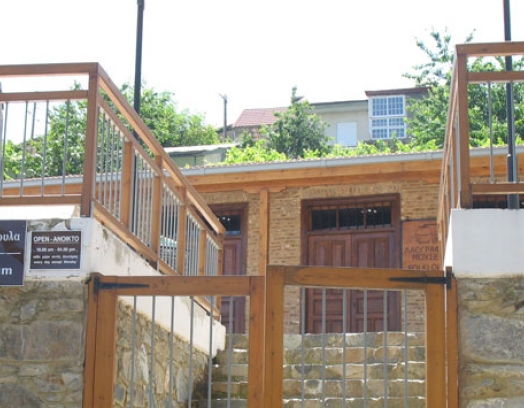One day I admitted to myself, slightly mournfully, that my Greek still left a lot to be desired. It was rusty through lack of use (compared to my Russian and English) despite all the effort I’d put into studying and the occasional cramming session. I decided to take a look at the University of Cyprus’ website as I’d heard from my friends that they run excellent language courses.
I am pleased to say it was the right decision! I'd now like to share with you my personal experience of learning Greek at the School of Modern Greek of the University of Cyprus.
The school’s website can be found at the following link where you can find the application form in two formats: pdf and Word. It looks like this and, as you can see, is given in both Greek and English (incidentally, you’ll need good knowledge of English, at the very least a good grasp of spoken English, if you decide to enrol on this course). Fill in the form and either send it by email or fax, or submit it in person to the administrative office. Please note: it states early on in the application form that you will be contacted upon receipt of the application in order to confirm receipt.
How It All Began
It was Summer, early June.
For some reason, I had to wait two months for confirmation from the school. Maybe the administrator had run off on holiday, who knows! During that time, I wrote them a kind reminder in the hope that they wouldn’t forget about me. Nevertheless, while I was still waiting for that elusive reply, the school ran its July ultra-intensive language course…
The end of August rolled round and I finally got my coveted answer and with it a phone call asking me to verbally confirm the seriousness of my intentions.
They offered three options: the month-long, brain-frying intensive course (mentioned earlier), an accelerated three-month course, and the classic semester-long course. I opted for course number 2. I thought about it and listened to the stories and experiences of my friends who’d thrown themselves into the month-long intensive course (8 hours of group study a day plus homework) and decided it wasn’t for me. As I see it, the month-long intensive course would only suit you if you plan on taking the plunge, moving to a Greek-speaking environment and speaking only Greek after the course. At the other end of the spectrum, if spending a whole year working through the language slowly but surely doesn’t appeal to you either, you’ll be making the right decision if you opt for the three-month course.
Intensive courses at the University of Cyprus are held from September 18th to December 15th. I believe there are similar programs at other universities across Cyprus too. Before the course begins, you need to sit a test to assess your level. It comprises both written and oral elements and they use your results to place you into a system with the following levels: A1 — for beginners (learning from scratch), A2 — for those with basic communication skills, a good vocabulary and basic grammar, then B (1 and 2) and C.
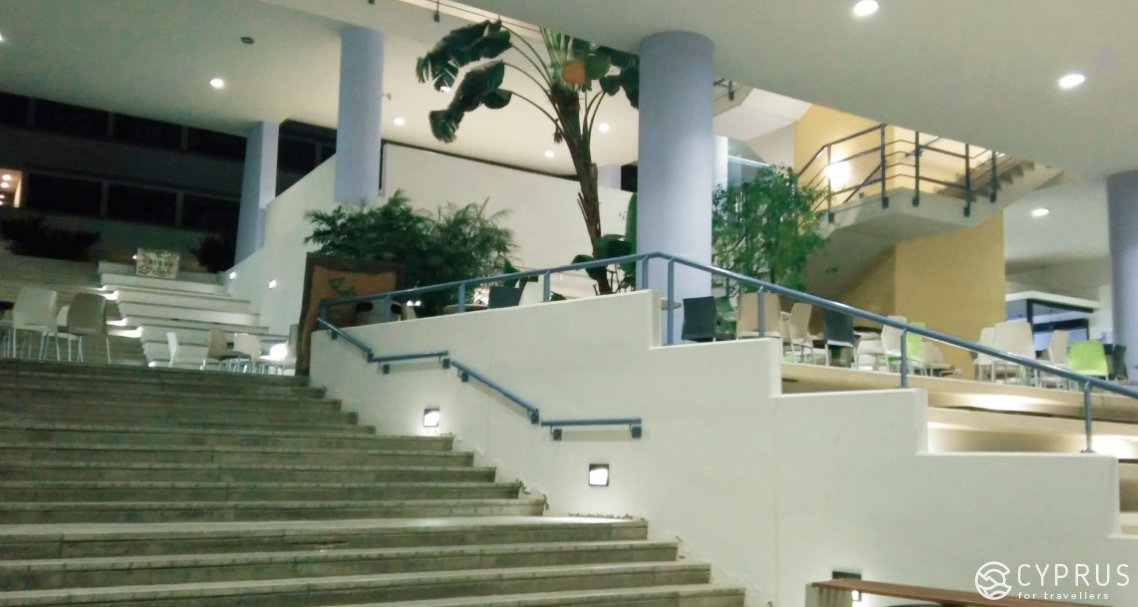
So, on September 2nd, I found myself sitting the three-hour long placement test in the Erasmus building. It’s free to sit the test. Looking around, I noticed that the contingent of Greek-studying hopefuls were mostly young people, former students from Russia and Central Europe, and people from Lebanon and the Arabic countries. There were also older people, such as Pontic Greeks that had arrived with their whole families, and a few Brits in the same position...
Remember: when you get to the test, you can always as for help from the organisers if necessary. The written part of the test involved filling in a bound file (as you go on it’ll become clear that this is the main testing method on this uni language course).
I enjoyed the test: it starts out simple — you had to write and advise a friend that wants to come to your country for work; then you have to read a text for comprehension and then answer questions on it. The final part of the test is for more advanced students (with a bit more studying under their belt than me!): you had to write synonyms for certain words. I didn’t do it at all but didn’t worry because I realised I’d just naturally reached my limit and therefore stopped.
Next up was oral test: I went into another classroom with a teacher, Hilaria, and we talked about personal topics. If don’t understand something, they will repeat it in English if needs be.
After that, I waited a few days for the letter telling me what to do next.
-
Now I had all the necessary information, all that was left to do was pay for the course either in full or half by bank transfer to the University’s account. The three-month course comes out at 400 euros (the tuition fee) + 20 euros for university expenses. The customer name and ID number should be entered on the bank transfer form.
A tip: It’s worth remembering that getting in touch personally goes a long way even in such a prestigious place as the University of Cyprus. I found that the whole process ran a lot more smoothly when I contacted them by phone to check on progress while in that preliminary stage before I’d registered for the courses but after receiving confirmation that the application form I’d filled out had been filed. The staff informed me of the next steps. This was vital because, despite receiving an official letter and being called, when I got to the exam, it turned out I hadn’t been entered into the database for some reason and my presence was a surprise to everyone involved!
The final step involved going to uni for final registration and getting a notice (in Greek and English) detailing the conditions that need to be met in order to receive
the final certificate based on your results: full payment of the course by the time you sit your first exam, good exam results in both mid-course and final exams, and good attendance. So, with the letter with payment details and address of the admin office, the pink payment receipt, my passport (or ID) and a photocopy, in hand, I went to register.
Something else to be aware of: for some reason I didn’t get a call about my test results and we had to figure out what group we were supposed to be in one the first day at the School.
My placement test results put me in a strong A2 group.
On top of all that, they kept making a mistake with the spelling of my surname despite the fact I’d already explained it a thousand times to the office in person (I found it best to explain things face to face after my previous attempts.) This was a source of mirth to all those present. In the end, we made another attempt, all in good humour, and we managed to figure everything out and I finally left, hotly anticipating our classes.
Student Life
The Intensive Course classes take place 18:00 – 21:00 Monday to Thursday.
Group sizes are small (10-12 people) so that everyone gets the attention they need. Our group was soon whittled down to a core of 6 students who attended regularly. The others dropped out (some students on free benefits just gave up, others transferred to another level for one reason or another, or to a less intensive course because of the high workload). Incidentally, this is a good thing: if you demonstrate better knowledge than other students early on or, vice versa, you are lagging behind — there is always the chance to find the class you need. In fact, it’s set out in the School’s rules.
My Memories of the First Classes:
As you may expect, the first lesson chaotic and lively: a lot of students are late for some reason (which is often generally how things are in Cyprus), groups of students are in no hurry to get from room to room. You can be sitting in a classroom and people sitting alongside you suddenly just silently get up and head for another room looking for their class. Students without textbooks noisily ask everyone where they can find them. They should be bought in advance at the campus shop, Parga Trading Ltd., at 26 euros together with CD. By the way, modern textbooks don’t have dictionaries at the end. Basically, the learning process sometimes seem to stall, and sometimes seems to rush on by. In general, how the second day of classes goes is a good indicator for the whole course.
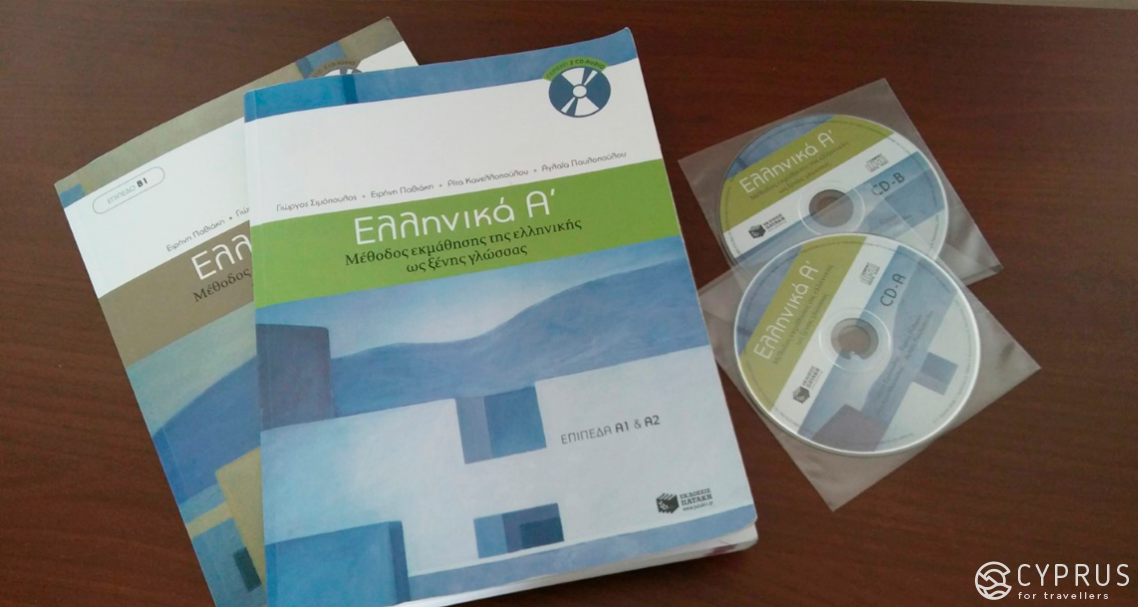
Your teacher will hand out a personal questionnaire to everyone. It’s vital that you fill it in completely honestly as all the data you provide is checked by the University and the Cyprus police and then stored in the school's database.
This is when your first forays in speaking Greek begin and from now on, you will find yourself talking a lot about yourself. By the second lesson, I realised it wasn’t difficult to study here: the comprehensive materials are easy to learn and there’s a 15 minute break in the middle of classes.
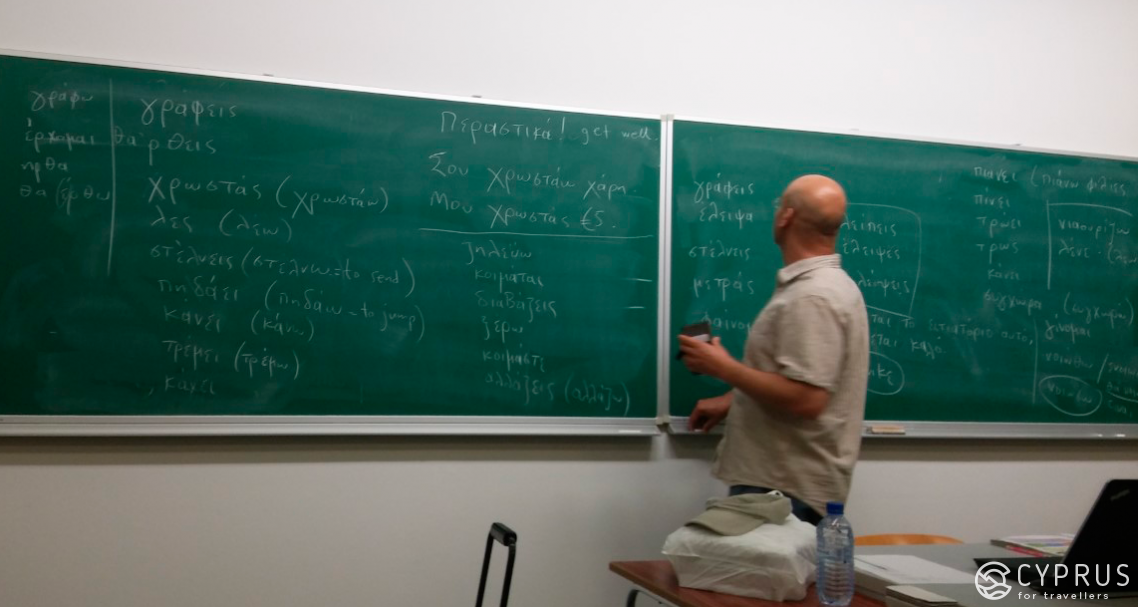
In just two weeks, I noticed huge progress: 4 three-hour classes a week + homework makes for good brain training! It was crucial to be in the zone during the course: you need your brain to be really switched on and focussed on the daily classes and 4-5 exercises of homework per day.
The classes are structured in such a way that you can quickly and easily immerse yourself in the language, learn grammar, try to communicate with your classmates, read aloud (with feeling: it’s mostly dialogues) and compose your own texts on a topic. We also sang karaoke ... I even heard that somewhere in the neighbouring classrooms or even other buildings, people started dancing to folk rhythms. We didn’t, but you really could often hear stamping feet, laughter and the sounds of Greek folk and pop floating out from the other floors and windows of nearby buildings.
It was anyone’s guess what was happening there, but I was distracted ...
Our teacher, Michalis, prepared additional material for us each lesson. We didn’t just run through the textbook but he introduced to key words and phrases that gave us a more rounded take on the Greek language.
What’s more, he even explained the grammar to us in Greek. He’d sometimes repeat it in English if needs be though. Once again, I’d like to remind you to brush up your English before you start the course. Michalis also told us about the etymology of almost every new word, which was very informative. When the topic turned to travelling or ancient Greek names that sounded somewhat familiar… well, I don’t think we would have got by without the YouTube videos or slides that our teacher used to illustrate his stories.
A tip:
If you’ve decided to study — just study, guys! It’s best not to miss any lessons and not just because the teachers make a note of attendance, your participation in lessons and whether you did your homework (that they set on a regular basis). The course is called intensive for a reason: the workload is high.
Michalis sent out emails to everyone who missed class with a summary of what we covered in the lesson so they wouldn’t miss out, but attending is person is still the best way to learn.
What’s more, it bears remembering the fact that they won’t issue certificates to those with low attendance figures.
The best bits:
Our classes were held in the university's new campus: a beautiful and well planned-out campus with modern infrastructure and services: it has its own radio station, cafe and cafeteria, bookstore and even banks and a hairdresser. The practical and well-thought-out grounds boast multiple terraces, green spaces and lawns with benches, pavilions, and fountains. There are several vending machines selling drinks and snacks near classrooms for those who need to grab a quick bite.
Don’t shy away from and refuse to sing Greek songs during classes. I always used to run a mile from karaoke but, here, I’m happy to sing along with the hit pop singer Michalis Hatzigiannis! We sang «Η αγαπη που μενει» that you can find here. What's more, my classmates who sat silently at first and just listened to my crooning, later surprised themselves and suddenly got involved! By the end of the course, we were all singing along and having a whale of a time!
A Word of Warning:
I soon discovered that intensive classes come with some side effects. Really! Alongside living with a constant sense of putting my brain through the wringer, something else happened. It turns out that one of the features of the Greek language, the even spread of stress throughout the sentence, is catching! While it might help you learn Greek faster, which is a definite bonus, you soon find yourself starting to speak your own language in the same way! Your speech starts imitating Greek and becomes littered with phrases like «no no» and other Greek quirks!
I still catch myself doing this from this time to time ... mainly since I stopped looking for the «switch input language» button on my pencil at around the 9pm when our evening lessons finished!
We’re Halfway There…
On November 4, we had a test on what we’ve covered thus far — a kind of semi-final! Just like the placement test (and later the final exam), this one also lasted 3 hours.
Shortly after the test, I got a call from the School’s admin office and they requested that I create an account on the website, www.ucy.ac.cy, and open an email account with their guidance.
As it turned out, they were supposed to send me a link to an online questionnaire about how we’d rate our teacher. The whole process was complicated, almost as if it was classified. In a matter of days, my inbox was spammed by the uni admin with emails on everything and anything: «don’t forget the party this week», «take part in a charity sale!», «why not start learning Spanish?». The link was sent out but, for reasons still unknown, I opened the email but couldn’t find it.
I was so close but yet so far. Later, being the responsible person I am, I decided to talk to my fellow classmates about it. They wisely told me «not to sweat it» so I didn’t. In the end, they did send me the right link!
Graduation
The day of the final exam arrived. We were being tested on everything we’d sped through in the last three months. It lasted 3.5 hours and was made up of two parts: oral and written. They invited in an impartial teacher to conduct the oral test. The format involved testing two students at once so that we could improvise dialogues with our partner alongside the standard conversations with the examiner about ourselves and describing pictures.
I, of course, tried my best to remember everything; I revised hard and felt good but, in the end, during the exam I had the feeling it could have gone better. The examiners, however, said I'd done a great job!
The second part is the written part, which makes up the bulk of the test. The first tasks were listening exercises: we listened to 20 minutes of various short dialogues and filled out the tables in response. The quality of CD can vary: just like on the course, sometimes the recordings are high-quality, professional and have clear sound, the text is read out by actors with good diction and clear articulation; sometimes the recordings were not so great (mainly the extra materials outside the course program) where the people spoke less clearly and pretty quickly. As for me, I don’t always even understand my fellow countrymen when they talk in this way and when it comes to a foreign language, well... I suppose it’s a good challenge!
Remember: a lot of the written tasks are tricky: if you generally grasped the gist of the information without going into details, your final result will be lower than expected. The thing is, the questions (often two-parters) are written in such a way that mean you must answer with logic and common sense.
After that, a weighty and serious-looking booklet with the University logo on the front page is handed out (this is where you write your name and contact details). Now you have to complete the main part of the written exam. Everything has been thought through and, as usual, starts off simple and ends up more difficult.
The test starts out with multiple-choice questions but soon includes tasks that demand the use of both logic and a demonstration that you remember the topics covered in lessons, homework, and the course books (we read a detective story). The end of the test is made up of the most complicated tasks that ask you to write a stream of consciousness: you have to write couple of letters in an appropriate style. The first one is to your boss (with your brief resume), and the second one is to your friend on the topic provided.
This was where you had to show off your skills and knowledge gained from the course!
Some people got really stressed out at this stage while some were only a bit nervous. As far as I was concerned, it was simply the final hurdle so I didn’t even feel particularly worried.
Once the exam was, we «graduates» were invited to a party with the teacher in a restaurant with live music. I didn’t go because I could hardly keep my eyes open from fatigue and had other things to attend to... I hope everyone had a good time!
By the way, if you are lucky, your group, which starts off as a bunch of randomly selected students, will turn out to be a group of new friends! Definitely go to the party!
The finishing touch: the teacher sends each student his/her results individually, and then the secretary of the School of Modern Greek informs you when you can pop in and pick up your certificate.
So, is it all worth it?
I won’t lie: it's good to start talking and immerse yourself in the language environment where you will remember more and more each day and get to practice with native speakers. As for me, I'd picked up some Greek over the years but didn't use it as much as I could have... so I now believe academic courses are important for both immersion in the atmosphere, as well as understanding the structure of the language, and gaining the skills you need to master it well.
I really believe that no matter how much you think you lack the talent for foreign languages, this course is like a booster shot of knowledge and practice: you won’t be able to stop yourself from talking!
What’s more, it's great that it only lasts 3 months. Everything in moderation, as they say. After all, any more and I think it would be information overload and we’d risk burning out.
In general, I enjoyed every minute and found everything really useful. I also loved feeling like a student again, surrounded by the hubbub and energy of the university students on campus. It really took me back to my days at the Russian State University for the Humanities after all these years!
Good luck!
I would like to take this opportunity to express my particular gratitude to my teacher at the School of Modern Greek at the University of Cyprus, Professor Michalis Michail, for his unwavering kindness, enthusiasm, and dedication to producing great results.
My next feat, my «Mount Olympus» to scale, is reaching the dizzying heights of the B level. However, in all likelihood, I’ll embark on that mission after a short break: there
is no intensive course for the B level at the moment and a semester is too much of a commitment when you are no longer 18-20 and you have other things to deal with in your life.



